

The Internet With A Human Face - Beyond Tellerrand 2014 Conference Talk. Anyone who works with computers learns to fear their capacity to forget.
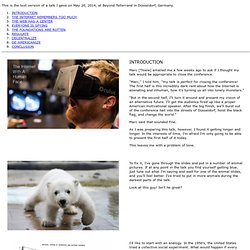
Like so many things with computers, memory is strictly binary. The Internet's Original Sin. Ron Carlson’s short story “What We Wanted To Do” takes the form of an apology from a villager who failed to protect his comrades from marauding Visigoths.

Glenn Greenwald: from Martin Luther King to Anonymous, the state targets dissenters not just "bad guys" A prime justification for surveillance – that it's for the benefit of the population – relies on projecting a view of the world that divides citizens into categories of good people and bad people.
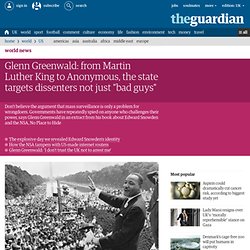
In that view, the authorities use their surveillance powers only against bad people, those who are "doing something wrong", and only they have anything to fear from the invasion of their privacy. This is an old tactic. In a 1969 Time magazine article about Americans' growing concerns over the US government's surveillance powers, Nixon's attorney general, John Mitchell, assured readers that "any citizen of the United States who is not involved in some illegal activity has nothing to fear whatsoever". NSA revelations: the 'middle ground' everyone should be talking about. As if there wasn't already enough NSA mass surveillance to worry about, last week we got a peek at the agency's arsenal of tools for exploiting the hardware and software of its targets.

They're best described as a veritable SpyMall catalog of sophisticated concealed gadgets and surreptitious software "implants", each sneakier than the last in its ability to compromise and extract private data from the computers and phones on which they're installed. If you still thought there was anywhere in the electronic world to hide after you're in their sights, this should be enough to disabuse you of that notion once and for all. This lies atop six months of news of the myriad ways our metadata and, in some cases, our content, is being routinely collected and analyzed, cloud services and communications providers being compromised, and security standards that should be protecting us being sabotaged.
Eye catchers / #JulianAssange on CNN's OutFront (28 Nov 2012) #surveillance #wikileaks #ecuador. The Effects of Mass Surveillance on Journalism. Media coalition urges better protection of First Amendment rights in NSA, FISA court matters. The Reporters Committee for Freedom of the Press, joined by 36 other news media organizations, filed public comments calling on the president’s Review Group on Intelligence and Communications Technologies to more carefully balance the secrecy sometimes required in national security investigations with the public’s right to know what its government is doing.
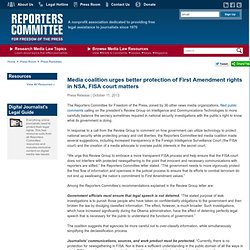
In response to a call from the Review Group to comment on how government can utilize technology to protect national security while protecting privacy and civil liberties, the Reporters Committee-led media coalition made several suggestions, including increased transparency in the Foreign Intelligence Surveillance Court (the FISA court) and the creation of a media advocate to oversee public interests in the secret court. Among the Reporters Committee’s recommendations explained in the Review Group letter are: Government officials must ensure that legal speech is not deterred. Support for additional discussion programs is needed. Why NSA’s Bulk Data Seizures Are Illegal and Unconstitutional » Publications » The Federalist Society. Why NSA’s Bulk Data Seizures Are Illegal and Unconstitutional October 21, 2013 Randy E.

Barnett, Jim Harper Why NSA’s Bulk Data Seizures Are Illegal and Unconstitutional. The debate continues on Edward Snowden: hero or traitor. Official means of oversight of American and British spying have failed.
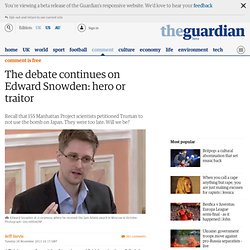
So we are left with the protection of last resort: the conscience of the individual who will resist abuse of power or expose it once it is done. At the Guardian Activate conference in New York last Wednesday, I moderated a heated panel discussion about the NSA affair with former US Senator Bob Kerrey, a member of the 9/11 Commission; Professor Yochai Benkler, codirector of the Berkman Center for Internet & Society at Harvard; and journalist Rebecca MacKinnon, a New America fellow. "We do not have appropriate mechanisms to hold abuse accountable," MacKinnon said, and to more or lesser degrees, the panelists agreed that oversight is at least too weak. . • Executive-branch oversight is by all appearances nonexistent. • Congressional oversight didn't exist before Watergate, Kerrey said, and when it was established, it was made intentionally weak. NSA surveillance: The US is behaving like China.
Even though we know governments do all kinds of things I was shocked by the information about the US surveillance operation, Prism.
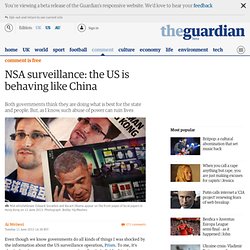
To me, it's abusively using government powers to interfere in individuals' privacy. This is an important moment for international society to reconsider and protect individual rights. I lived in the United States for 12 years. This abuse of state power goes totally against my understanding of what it means to be a civilised society, and it will be shocking for me if American citizens allow this to continue. 'After 9/11 NSA had secret deal with White House' BruceSchneier. Farewell to Modernity in the New Age of Surveillance. As has been said, probably rightly, the 19th century did not end until 1914, when the First World War broke out; similarly, the 20th century did not end on New Year's Eve 2000 or New Year's Day 2001, as the calendar would suggest, but continued for another few months. I daresay that the 20th century finally ended only on September 11, 2001, when suicide bombers succeeded in attacking the World Trade Center. Naturally, terrorism had been known for a long time.
It was known all too well to 19th-century Europe. It also existed in the 20th century, and in plenty of shades. The Politics of Surveillance: The Erosion of Privacy in Latin America. While most Latin American countries have democratically-elected governments, many still fail to respect human rights, including the right to privacy.
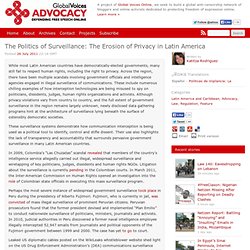
Across the region, there have been multiple scandals involving government officials and intelligence agencies engaged in illegal surveillance of communications. These include numerous chilling examples of how interception technologies are being misused to spy on politicians, dissidents, judges, human rights organizations and activists. Although privacy violations vary from country to country, and the full extent of government surveillance in the region remains largely unknown, newly disclosed data gathering programs hint at the architecture of surveillance lying beneath the surface of ostensibly democratic societies.
These surveillance systems demonstrate how communication interception is being used as a political tool to identify, control and stifle dissent.